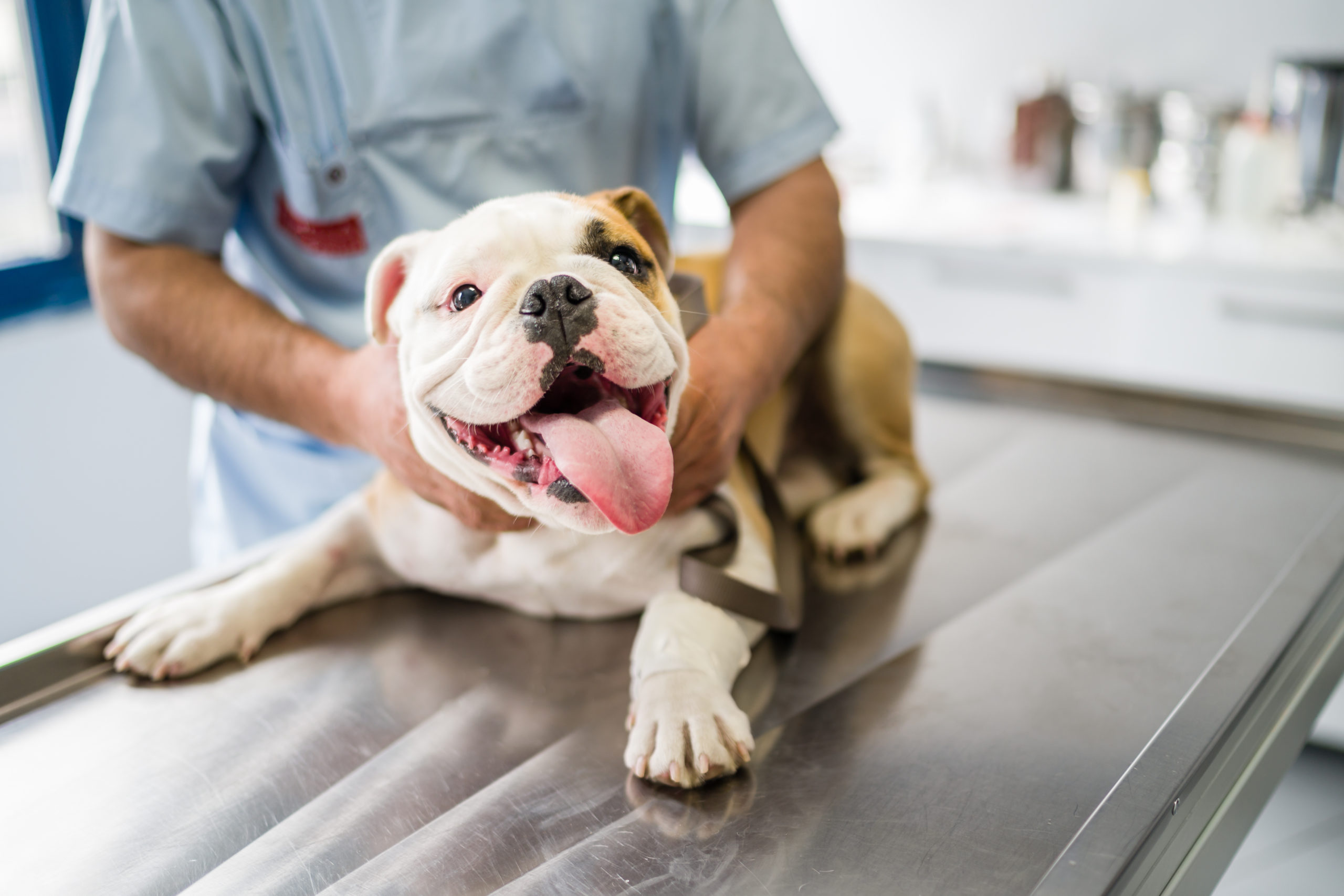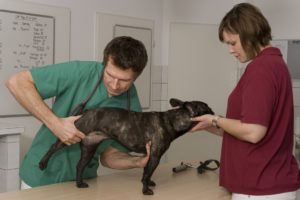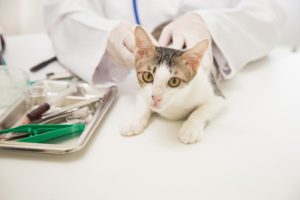
Spay & Neuter
What is Spaying?
Spaying removes the ovaries and, uterus in female pets so they do not have heat cycles and cannot reproduce. Spaying has health benefits for female pets. Female dogs and cats will experience a reduced risk of uterine and breast tumors. Un-spayed adult dogs and cats frequently develop a life threatening infection in their uterus called Pyometra that requires life threatening emergency surgery.
We recommend spaying female dogs 4-5 months after their first heat cycle and female cats after they come into heat. Allowing the heat cycle has health benefits. Our veterinarians can schedule this procedure at the right time.
Spaying Dogs by Our Veterinarians
Dog’s heat cycles are usually about 7 months apart. It takes 3-4 months for the uterus to get back to normal size after a heat cycle. We prefer to wait 4-5 months after the heat cycle but the surgery can be performed while in heat or shortly after, however it does add surgery time and expense if the uterus is enlarged.
All dog spay surgery patients receive Multi-Modal Pain Management including injectable analgesic’s before and after surgery, local anesthesia and therapy laser to the surgery site. We will dispense oral medications to make your pet comfortable at home. Sutures are below the skin and will dissolve.
Patients are scheduled for surgery admitting around 8 am. They must be fasted; however it is OK to allow free access to water. They are discharged in the afternoon.
Spaying Cats by Our Veterinarians
Cat’s heat cycles are usually seasonal starting in the spring and ending in the fall. Cat’s heat cycles last about a week. Cats in heat behave strangely and often howl like they are in pain. The process begins again three weeks later, and occurs until the pet becomes pregnant.
We use Multi-Modal Pain Management for our cat spay patients as well.
What is Neutering?
Neutering removes a male pet’s testicles. Neutering protects a male dog’s or cat’s health by reducing the likelihood of prostate problems and testicular cancer. Like females there are physical and behavioral benefits to allowing full maturation of male dogs and cats.
Neutering Dogs by Our Westlake Village Veterinarians
Traditionally neuter surgery involves an incision near the scrotum, from which the testicles are pushed forward to the incision and removed.
An alternative surgery is to make a smaller incision directly thru the thinner scrotal skin with a surgical laser instead of scalpel.
All dog neuter surgery patients receive Multi-Modal Pain Management including injectable analgesics before and after surgery, local anesthesia and therapy laser to the surgery site. We will dispense oral medications for make your pet comfortable at home. Sutures are below the skin and will dissolve.
Neutering Cats by Our Veterinarians
Adult male un-neutered cats are known to and mark with urine in the house. Urine is a powerful communication tool — cats can tell a great deal about each other from it including age, sex, status and sexual availability. Although adult cats of both genders, whole as well as fixed, might spray under specific circumstances, intact ones are most often guilty of the smelly behavior.
Whole males, as a rule, spray. Pheromones, released into the urine, advertise they’re ready, willing, and on the alert for girlfriends. Additionally, cat spraying broadcasts clear messages to other male cats to stay away. Intact female cats spray too — the chemicals in their urine indicate where they are in their cycle.
Spray from intact cats is more pungent than from those who are fixed. The unpleasant smell is easier to detect from a distance — important for advertising for a special friend.
We recommend allowing as much physical development as possible, usually after 8-09 months of age.
Male cats are neutered with a scrotal scalpel or laser incision.
Spay FAQs

Spay FAQ: What You Can Expect from Your Westlake Village Vet
At Anza Animal Clinic, we take pride in providing your pet with the level of care he or she needs. A key part of caring for your pet is ensuring your animal is well protected from disease. We also work to help control the overall animal population. To achieve this, we recommend spaying your dog or cat. Visit your vet in Westlake Village to discuss whether spaying your dog or cat is the right decision for your animal. Our team is here to answer all of your questions.
What Is the Recommended Age to Have My Dog or Cat Spayed?
The American Kennel Association recommends waiting to spay your pet between five and nine months of age. Waiting until after the animal has gone through puberty offers some key benefits to the animal. In some situations, doing this as early as five months of age, before the first heat, will provide an animal with a reduced risk of mammary tumors. It’s always best to let our veterinarian help you to make the right decision about when to spay.
What Are the Benefits and Reasons to Have My Dog or Cat Spayed?
There are many benefits of spaying. First, it helps prevent unplanned puppies. This is an expensive cost to any pet family. And, finding good homes for puppies, even those that are purebreds is not easy to do. Keep in mind there are many pets euthanized each year because of a lack of homes. Spaying can help to reduce the risk of illness in females including mammary tumors. In some situations, spaying your cat or dog can also help to reduce the tendency to roam. That means your pet isn’t likely to stray from your home.
Is the Surgery Painful for My Dog or Cat?
The surgery itself will not be painful for your pet because she will be given pre and post-surgical analgesics. We use very safe anesthesia to help ensure your pet is relaxed and still during the procedure. We take every step possible to safeguard your pet’s health here.
Will I Be Sent with Medications to Give My Dog Or Cat If Needed After Surgery?
We will send your pet home with oral pain medications for several days.
How Can I Make An Appointment with Anza Animal Clinic to Have My Dog or Cat Examined for the Spay Surgery?
We welcome you to come into Anza Animal Clinic to discuss your pet’s needs for spaying. We recommend having a puppy visit with us first as a step towards this procedure. We’ll discuss risks, benefits, and the specific process. Contact your veterinarian in Thousand Oaks to get the appointment you need to spay your cat or dog. Call our office today for an appointment: (805) 495-1059.
Neuter FAQs

Your Westlake Village Veterinarian Answers FAQs about Neutering
Unless you are a professional breeder, you should have your male dog or cat neutered to prevent unwanted litters and to reduce your older pet’s risk of chronic diseases associated with sustained levels of certain hormones. Your vet in Westlake Village also wants pet owners to know that a neuter procedure is minimally invasive involving a tiny incision and a short 24-hour recovery time.
What are Benefits/Reasons to Have My Dog or Cat Neutered?
Of course, the main reason you should have your pet neutered is to help reduce the unwanted pet population. Millions of dogs and cats are needlessly euthanized every year because neglectful pet owners fail to neuter or spay their pets. Neutering also reduces the urge for male dogs and cats to roam, engage in aggressive behavior and mark their territories by removing the testes and stopping testosterone production. For dog owners who are embarrassed when their unneutered male dog suddenly gets “too friendly” with house guests, neutering can help prevent your dog from “acting out” their reproductive urges. Finally, neutering significantly reduces a pet’s risk for suffering prostrate issues while preventing testicular cancer.
What is the Recommended Age to Have My Dog or Cat Neutered?
Neutering as an adult has several physical and behavioral benefits for your pet. We prefer to allow dogs to mature to 1 year of age and allow cats to mature to 8-9 months.
How Long Does a Neutering Procedure Take?
Neutering a dog or cat takes less than 30 minutes. With dogs, absorbable sutures are used to close the incision. Cats do not require sutures since the incision is so small.
How Can I Make An Appointment with Anza Animal Clinic to see if now is the Time to Neuter My Pet?
If your pet is over four weeks old, call our clinic today to schedule a wellness check with your veterinarian in Thousand Oaks. Once the vet deems your pet healthy, you can then schedule another appointment to have the neuter performed. All new clients receive 25 percent off their first visit!
It is never too late to neuter your dog or cat. Call Anza Animal Clinic today at (805) 495-1059.
Every year thousands of stray and unwanted animals are euthanized in shelters across the United States. Many of these deaths are the avoidable result of owners failing to spay and neuter their pets. Even if you keep a close watch on your pet, accidents happen, and unexpected offspring means more animals that won’t be given the chance at full, happy lives.
Spaying and neutering can help end this cycle, and both procedures can have health benefits for pets.
Spaying
Spaying is a common surgical procedure performed on female cats and dogs. The process is called an ovariohysterectomy and involves removing the patient’s uterus, ovaries, and fallopian tubes, rendering the animal incapable of reproduction. Anza Animal Clinic veterinarians recommend spaying your pet at 6-12 months, depending on your dog’s breed and ideally before the patient’s first heat.
Benefits:
- Prevents unwanted pregnancies
- Eliminates the risk of ovarian and uterine tumors
- Remove the possibility of uterine infections
What to expect after surgery
Spaying is a major surgery requiring 10-14 days of recovery time. Recovery may also include pain medication and lethargy is common for the first couple of days following the procedure.
Neutering
Neutering is performed on male cats and dogs. This process castrates the animal, removing their testicles and making them unable to impregnate females. Neutering is advised when your pet is 6 months old but can be performed on older animals as well.
Benefits
- Placates the animal, reducing aggressive behavior and decreasing dominant tendencies
- Reduces roaming and spraying (territory marking)
- Eliminates the risk of testicular and prostate tumors
What to expect after surgery
Although less invasive than spaying, neutering is still a major medical procedure that requires some recovery time. Recovery may also include pain medication and lethargy is common for the first couple of days following the procedure. It’s extremely important that you monitor your pet to prevent the animal from licking or biting the incision to reduce the risk of infection.
To learn more about spaying and neutering, or to Make An Appointment, contact us at (805) 495-1059.
